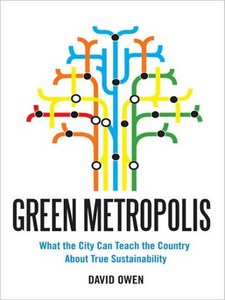Earth Day and cities
 For 10+ years I've joked that my efforts on a variety of urban issues are a form of "built environmental justice."
For 10+ years I've joked that my efforts on a variety of urban issues are a form of "built environmental justice."The environmental justice movement more generally is about linking social justice and equity considerations to the placement/links between environmental hazards-problems and race and economic segregation. For example, chemical plants and noxious uses like trash transfer stations tend to be located in poorer communities where residents tend to be less organized.
2. Today is a good reminder to read David Owen's Green Metropolis, which makes the argument that because of its high transit use, low automobile-gasoline use, comparative low per capita generation of trash and efficient use of energy, New York City is one of the "greenest" places on the planet.
3. This year's Park Pride Parks and Greenspace conference in Atlanta focused on cities and low impact development-water infrastructure. The conference was earlier in the month and many of the presentations are online.
4. I've been thinking about solid waste because DC is in the midst of doing a solid waste plan and there is a public meeting next week (April 30th) although there is a distinct lack of information on the website.
Years ago I wrote about Johannesburg and how they branded and organized their waste collection function as "Pikitup." See the 2005 blog entry, "Every Litter Bit Hurts."
Why couldn't DC do something similar and take a very active role in waste reduction as part of the planning function of Public Works?
For example, I was very much impressed with how DC Water's new program for compost generation will reduce "solid waste" generated for compost by 60% leading to a reduction in truck trips, plus how the process will generate 1/3 of the plant's elextricity. Pretty impressive ("DC Water adopts Norway's Cambi system for making power," Washington Post).
Then I saw an article about a cement plant using tires for fuel via a process that reduces waste and pollution simultaneously ("Old tires to roll on as fuel for Tijeras cement plant," Albuquerque Journal). A few times/week I ride past the concrete plant in Fort Totten and I am always thinking how they could systematically reduce truck trips if they would receive their raw materials by train. It could be a great way to get rid of old tires too.
5. We can't forget disaster planning and climate change given the earthquakes, tornadoes and other storms that regular cause havoc in cities around the world.
6. Nor urban agriculture, but I wrote about an element of that a few days ago. Next week, Environmental Action is sponsoring an online "Food Revolution Summit."
And the Edible Communities group, which publishes local food magazines in 80 different parts of the US (off and on Edible DC publishes, and will relaunch this summer, but the closest one that is actively publishing is Edible Blue Ridge) has their annual institute May 10th and 11th in New York City. The program lineup looks pretty amazing.
Labels: green-environment-urban, sustainable land use and resource planning, sustainable transportation, urban agriculture





8 Comments:
we could have a high level discussion on the enviromental movement and they fundamental anti-human and anti-growth passions it endengers. Refugees from Bangladesh on tankers, etc. But this is the internet, and I'll say yes, I do agree with you on the city.
That being said, based on a previous discussion with you on planning, I'd say a lot of what you are describing is the "tight" city -- versus the leaky city which is Washington.
DCWASA is an interesting case of a tight organiztion in this area. Well aspiring to be tight.
been thinking about this in terms of how Liverpool has Liverpool Vision as the ec. dev. agency of the city and has integrated and branded its culture functions within Culture Liverpool.
Long story I won't go into, the current interim chair of the DC Commission on the Arts and Humanities is "undeserving." But in a city where such positions were held by people who know what they are doing, she wouldn't be in the position...
so yes, we are pretty leaky-loose.
DCWASA does show it's not out of the question to up our functioning.
my big problem with environmentalists in the USA is that they are almost all anti-urban and pro automobile- and are usaully very highminded and unwilling to see their mistakes - generally- these people are blatant hypocrites.
well I used to say the same thing about the CFO's office.
And yet we survive. A lot of stored up capital in those streets.
"Long story I won't go into, the current interim chair of the DC Commission on the Arts and Humanities is 'undeserving.'"
So what's your beef with Lavinia?
-EE
I've been sick for a couple of weeks, to guffaw really really hard will make me cough incessantly.
not a story for print in any form... just remember, I was main street program manager in Brookland in 2007 and LW was chair of the Brookland "Community" Development Corporation and had been for many years.
Owens book i sgenerally very good bu the misses out on the advantages of DC as a place. I have to say I agree very much with what he is saying about most everything else. If only the environmentalists would listen to this guy....
nice information.It's so important to realize that every time you get upset, it drains your emotional energy.
Post a Comment
<< Home